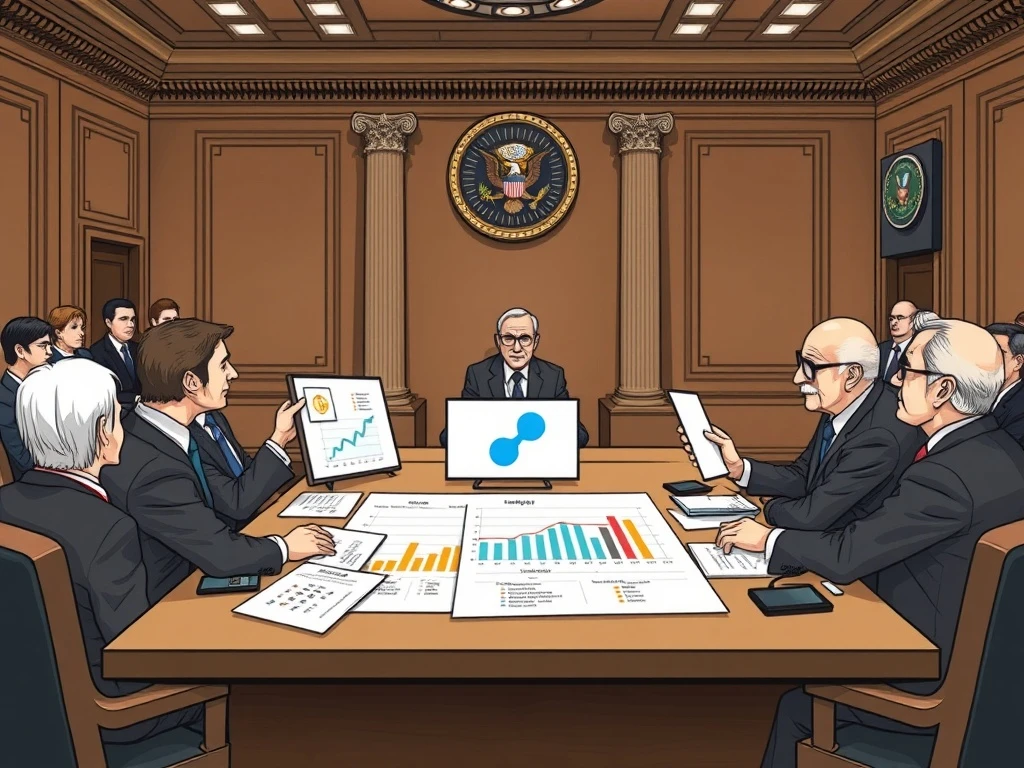Crucial Crypto Regulation Hearing: Ripple CEO, Ex-Regulators Address Market Structure

The future of the cryptocurrency industry in the United States hinges on regulatory clarity. A pivotal moment is approaching as top industry leaders and former regulators prepare to testify before the US Senate Banking Committee, focusing on the critical issue of crypto regulation and the structure of digital asset markets.
Key Voices at the Senate Hearing
On Wednesday, the US Senate Banking Committee will convene a significant Senate hearing. This session brings together a diverse group of stakeholders to discuss the path forward for digital assets in the United States. Scheduled to testify are prominent figures including:
- Brad Garlinghouse, CEO of Ripple
- Summer Mersinger, former CFTC member and CEO of the Blockchain Association
- Timothy Massad, former CFTC Chair
- Jonathan Levin, CEO of Chainalysis
- Richard Painter, former White House ethics lawyer
This hearing represents a key opportunity for lawmakers to signal their approach to potential market structure legislation, following stated goals to pass relevant bills later this year.
The Push for Digital Assets Market Structure
Understanding the appropriate market structure for digital assets is central to establishing a clear regulatory framework. This involves determining how these assets should be classified, traded, and overseen to ensure investor protection and market integrity.
As Summer Mersinger noted in her prepared testimony, the choice is not about whether to regulate, but how. The goal is to enact sensible legislation that prevents uncertainty and encourages financial innovation within the US, rather than pushing it overseas.
Legislative Momentum and Digital Assets
This Senate hearing occurs amidst increased legislative activity surrounding digital assets. Republican leadership in the House recently announced a focus on crypto-related bills during their ‘Crypto Week’.
Key legislation under consideration includes:
- The GENIUS Act, which addresses stablecoin regulation and has already passed the Senate.
- The CLARITY Act, aimed at providing greater legal certainty for digital assets.
- Legislation concerning the development of a US central bank digital currency (CBDC).
These efforts highlight a concerted push within Congress to establish a comprehensive regulatory environment for the crypto space.
Potential Conflicts and Crypto Regulation
The discussion around crypto regulation is not without potential complications. The inclusion of a former White House ethics lawyer among the witnesses suggests that lawmakers may address concerns regarding potential conflicts of interest, particularly in relation to political figures involved with the crypto industry.
Previous votes on stablecoin legislation have seen some lawmakers raise questions related to such ties, indicating that these concerns remain part of the broader regulatory debate.
Ripple CEO’s Role in Policy Discussions
Brad Garlinghouse, the Ripple CEO, has become an increasingly active participant in policy discussions in Washington, D.C. His testimony at the Senate hearing marks one of his direct engagements with US lawmakers on this level.
Ripple has previously demonstrated its engagement through actions such as donations and participation in White House events, underscoring the industry’s effort to directly contribute to the legislative conversation.
Conclusion: A Critical Juncture for Digital Assets
The upcoming Senate hearing is a crucial event for the future of digital assets and the implementation of clear crypto regulation in the United States. With leaders like the Ripple CEO and former regulators offering insights into market structure, lawmakers have an opportunity to move towards a framework that fosters innovation while providing necessary safeguards. The outcome of these discussions and related legislative efforts will significantly shape the landscape for cryptocurrencies and blockchain technology in the US for years to come.









